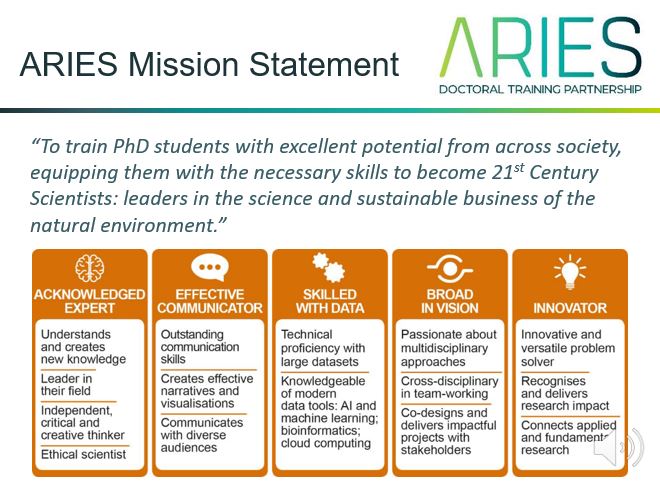ARIES Supervisory Charter
The ARIES Supervisory Charter defines the minimum standards and requirements expected within our Partnership for supervision of ARIES postgraduate Researchers (PGRs)
This charter establishes the basis for successful communication throughout the duration of the PhD is established with the obligations of the supervisors recorded. The list of duties is not exhaustive and the post-holder may be required to undertake additional duties and the duties may also be subject to change at anytime throughout the PGR’s studies. All ARIES supervisors are required to sign the charter to indicate their understanding and support of our expectations for supervision.
Primary Supervisor eligibility
The eligibility criteria for Primary Supervisors are that they:
- are employed by, and usually based at, an ARIES hosting partner institute or school/department.
- have a track record of research aligned to the NERC remit as evidenced by submission of research grant applications in the last 5 years to UK Research Councils, European Commission and Research Council, other UK or overseas government agencies, or similar bodies (charities, industry, etc.), in NERC-relevant areas (unless they are new investigators – see below)
- have a peer-reviewed publication record of research in the NERC remit in international journals that would be deemed “internationally excellent” or “world leading” according to current REF criteria.
- would normally be eligible to be a PhD Primary Supervisor according to their institute’s criteria for institutionally-funded studentships.
- have undertaken approved professional development training in relation to their supervisory role within the last 3 years.
- have a 100% record of formal progress reporting for at least the previous 12 months for all of their PGR students.
- are in compliance with NERC and DTP requirements.
Where an inexperienced primary supervisor is proposed (e.g. a new investigator), a more experienced supervisor will need to be nominated to the supervisory team.
Supervisory teams
Supervisory teams must comprise a Primary Supervisor and at least two more members. For PGRs hosted by non-Higher Education Institution (non-HEI) Partners, the second supervisor must be based at and employed by the Higher Eduction Insitution (HEI) of registration. All PGRs should have access to at least two supervisors at the institute in which they are primarily located. For CASE (Collaborative Awards in Science and Engineering) and Collaborative awards, the external partners will provide a supervisor to the team.
Dealing with conflicts
In the case of conflict arising between the PGR and one or more supervisors, those affected may contact the PGR Director at the host institution who will mediate impartially between the parties. In cases where the relationship problems cannot be resolved, the ARIES Office should be consulted on any proposed changes to supervision and/or the project.
Supervisory obligations
Wellbeing & Research Environment
- Support the PGR both intellectually and personally and in accordance with the ARIES Equality, Diversity and Inclusion Policy.
- Undertake Equality & Diversity, and unconscious bias training at least every two years
- Agree a schedule of meetings, at a minimum of once a month, and be available to talk over research problems at relatively short notice. If you are not available, to provide an appropriate substitute.
- Be mindful of the pastoral, welfare and wellbeing needs of the PGR and be ready to sign-post or refer to other support services, including the ARIES Office, when necessary.
- Ensure compliance with the eligible statutory holiday, annual leave, compassionate leave, and sickness periods.
- Ensure that you clarify the expectation of your own institution and host organisation.
PhD Progression
- Provide the PGR with the necessary work equipment and workspace. This includes a writing desk and/or laboratory space, as well as computer equipment and software that are appropriate for the operational requirements and research objectives.
- Provide regular constructive feedback on written reports, papers, and chapters within a mutually agreed period and review progress toward research goals periodically.
- Provide a supportive and comfortable working environment with access to idea-sharing and discussion.
- Support the participation of the PGR in their commitment to ARIES mandatory training/reporting and carry out all administrative work pertaining to the PGR in a timely and accurate manner.
Career progression
- Provide the PGR with the possibility to gain experience, such as teaching experience, giving lectures, and advanced skills development. Assist with building and developing skills such as technical writing, oral presentation, problem definition, reviewing papers, and critical literature reviews.
- Support the PGR in the planning and application for financial resources, considering scholarships, bursaries, travel grants, stays abroad, or opportunities for contributing to bids for funding.
- Support the PGR in applying for internships, placements, and other opportunities to further their experience.
- Support the PGR in completing their annual training needs analysis (TNA) and review progression toward career goals periodically. Provide the PGR with career advice, noting that some PGRs may not wish to pursue an academic career and that their universities can support PGRs through their own Careers Service.
Commitment to the DTP
- Ensure the PGR attends all mandatory cohort training events, including Induction, Winter Schools, Summer Schools, and the inter-DTP symposia, except where absence is permitted due to exceptional circumstances.
- Ensure the PGR submits their Training Needs Assessment, DTP activity report, and UKRI ResearchFish submission on an annual basis or as otherwise required.
- Attend the ARIES supervisor instruction session (in person or online) within three months of their PGR registering.
Support the DTP by working with the partnership for example by:- delivering a training activity to a wide group of DTP students (e.g. advanced skills)
- providing input to an existing DTP training activity (i.e. as part of a cohort event)
- contributing to a stakeholder sandpit event (e.g. as a group discussion leader)
- be part of a studentship interview panel

